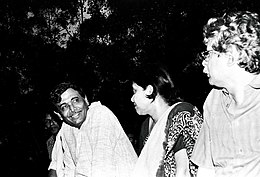Abdullah Abu Sayeed
- BA Hons (Bengali)
- MA (Bengali)
- University of Dhaka
- Ramon Magsaysay Award (2004)
- Bangla Academy Literary Award (2011)
- Ekushey Padak (2005)

Abdullah Abu Sayeed (born 25 July 1940) is a Bangladeshi educator, writer, television presenter, and activist. He is the founder and chairman of Bishwa Sahitya Kendra, a non-profit organization that promotes the study of literature, reading habits and progressive ideas.
Early life
Sayeed was born on 25 July 1939, to a Bengali Muslim family in Park Circus, Calcutta.[1][2] His father was Azimuddin Ahmed, a teacher of English and Bengali literature, and a playwright.[3][4] Their ancestral home was in Kamargati, Bagerhat District.[5] Sayeed passed the Secondary School Certificate (SSC) exam from RM Academy, Pabna in 1955 and the Higher Secondary Certificate (HSC) exam from Prafulla Chandra College in Bagerhat in 1957. He later earned BA and MA degrees in Bengali from the University of Dhaka in 1960 and 1961 respectively.[3] While studying at University of Dhaka, he organized, along with others, Birth Centenary of the Nobel Laureate Poet Rabindranath Tagore.[6]
Career
Sayeed started his career as a guest teacher at Government Haraganga College, Munshiganj. Then he taught at Sylhet Women college for some time. In 1962 he joined Rajshahi College as a full-time teacher. After 5 months he joined Government Science College, Dhaka. He was also an acting principal for 2 years when he was only 23 years old. He also taught Bangla as a part-time lecturer at BUET. He took voluntary retirement as a professor in April 1992.[7]
Sayeed gave an interview for the post of assistant professor. Being impressed by Sayeed's brilliance and personality, Dhaka College's renowned principal Jalaluddin Ahmed invited Sayeed to Dhaka College. Sayeed later became the department head of the Bengali language at Dhaka College.[8] He was very popular among his students. It is said that even students from other colleges came to attend his classes. He wrote a book on his teaching career named Nishfola Mather Krishok (Farmer of an infertile land). He edited the literary magazine Kanthashar (The Voice) in the 1960s which promoted a new trend in Bangladeshi literature.[1][2]
Sayeed started participating in TV programs from 1966. At first, he was presenter of children's programs and quiz programs.[9] In the mid-1970s, he started presenting Shaptabarna (Seven Colors), a TV show on Bangladesh Television.[citation needed] Saptabarna was telecast once a week. It was a 90 minute long program. In the 1970s and 1980s, he also presented TV show Eid Anadamela. He received the National Television Award in 1977.[10]
In 1978, he founded the Bishwa Sahitya Kendra. He has close association with Bangladesh Poribesh Andolan (BAPA) and Transparency International Bangladesh' (TIB).[11]

Works
Sayeed has written and edited more than 50 books.[12]
- Bidaye, Obonti (2005)
- Bohe Joloboti Dhara (2006)
- Bhalobashar Shampan (2007)
- Bishwo Shahitto Kendro O Ami (2007)
- Bisrosto Journal (2007)
- Amar Uposthapok Jibon (2008)
- Amar Ashabad (2009)
- Mrityumoy O Chiraharit
- Swapna-Duhswapner Galpo
- Rodanruposhi
- Juddhajatra
- Sangathan O Bangali
- Amar Ashabad
- Amar Boka Shoishob (2010)[12]
Awards
- Ramon Magsaysay Award (2004) in journalism, literature, and creative communication arts for "cultivating in the youth of Bangladesh a love for books and their humanizing values through exposure to the great works of Bengal and the world".[2]
- National Television Award (1977)[10]
- Mahbub Ullah Trust Award (1998)[1]
- Ekushey Padak (2005)[10]
- Bangla Academy Literary Award (2011) for his essays[13]
- Khan Muhammad Farabi Memorial Award (2012)[14]
- Star Lifetime Award on Education (2016)[10]
References
- ^ a b c "The 'bookworm' in full form: Abdullah Abu Sayeed turns 72". The Daily Star. 2011-07-27. Archived from the original on 2019-06-07. Retrieved 2012-12-25.
- ^ a b c "Sayeed, Abdullah Abu". Ramon Magsaysay Award Foundation. Archived from the original on 2017-09-11. Retrieved 2012-12-15.
- ^ a b Hossain, Selina; Islam, Nurul; Hossain, Mobarak, eds. (2000). Bangla Academy Dictionary of Writers. Bangla Academy. p. 2. ISBN 984-07-4052-0.
- ^ Lorraine Hahn (2005-01-14). "Ramon Magsaysay Recipient Abdullah Abu Sayeed TalkAsia Transcript". CNN. Archived from the original on 2012-10-05. Retrieved 2012-12-15.
- ^ Abu Sayeed, Abdullah (2001). বিস্রস্ত জর্নাল (in Bengali) (2 ed.). Dhaka: Sahitya Prakash.
- ^ "Abdullah Abu Sayeed: Spreading the light of learning". The Financial Express. Archived from the original on 2023-08-22. Retrieved 2023-08-22.
- ^ "Abdullah Abu Sayeed: Spreading the light of learning". The Financial Express. Archived from the original on 2023-08-22. Retrieved 2023-08-22.
- ^ Shamim Ahsan (2004-09-03). "Recognised for an Enlightening Pursuit". Star Weekend Magazine. The Daily Star. Archived from the original on 2016-02-07. Retrieved 2012-12-15.
- ^ "Abdullah Abu Sayeed: Spreading the light of learning". The Financial Express. Archived from the original on 2023-08-22. Retrieved 2023-08-22.
- ^ a b c d "Prof. Abdullah Abu Sayeed". The Daily Star. 2016-02-05. Archived from the original on 2016-02-06. Retrieved 2016-02-16.
- ^ "Abdullah Abu Sayeed: Spreading the light of learning". The Financial Express. Archived from the original on 2023-08-22. Retrieved 2023-08-22.
- ^ a b "Professor Abdullah Abu Sayeed's 80th birth anniversary today". The Daily Star. 2019-07-25. Archived from the original on 2019-07-24. Retrieved 2019-07-24.
- ^ "Bangla Academy prizes announced". bdnews24.com. 2012-02-18. Archived from the original on 2017-11-11. Retrieved 2012-12-15.
- ^ "Prof Abu Sayeed gets Farabi memorial award". The Daily Star. 2012-09-28. Archived from the original on 2018-08-10. Retrieved 2018-08-10.

- v
- t
- e
Government Service (1958–2008) | |||||||||||||||||||||||||
|---|---|---|---|---|---|---|---|---|---|---|---|---|---|---|---|---|---|---|---|---|---|---|---|---|---|
| |||||||||||||||||||||||||
Public Service (1958–2008) | |||||||||||||||||||||
|---|---|---|---|---|---|---|---|---|---|---|---|---|---|---|---|---|---|---|---|---|---|
| |||||||||||||||||||||
Community Leadership (1958–2008) | |||||||||||||||||||||
|---|---|---|---|---|---|---|---|---|---|---|---|---|---|---|---|---|---|---|---|---|---|
| |||||||||||||||||||||
Journalism, Literature, and the Creative Communication Arts (1958–2008) | |||||||||||||||||||||
|---|---|---|---|---|---|---|---|---|---|---|---|---|---|---|---|---|---|---|---|---|---|
| |||||||||||||||||||||
Peace and International Understanding (1958–2008) | |||||||||||||||||||||
|---|---|---|---|---|---|---|---|---|---|---|---|---|---|---|---|---|---|---|---|---|---|
| |||||||||||||||||||||
Emergent Leadership (2001–) | |||||||||||||||||||||
|---|---|---|---|---|---|---|---|---|---|---|---|---|---|---|---|---|---|---|---|---|---|
| |||||||||||||||||||||
Uncategorized (2009–) | |||||||||||||||||||
|---|---|---|---|---|---|---|---|---|---|---|---|---|---|---|---|---|---|---|---|
| |||||||||||||||||||




































